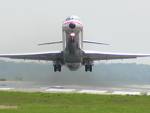ATA predicts major fall is summer traffic
 The Air Transport Association of America has released its summer air travel forecast, predicting that 7 percent fewer passengers (about 150,000 per day) will travel June 1 through Aug. 31, 2009, compared to the same period in 2008. Approximately 195 million passengers are expected to fly this summer on U.S. airlines, down from 209 million during the summer months of 2008. ATA is projecting that 7 percent fewer passengers (171 million versus 183 million) will travel domestically, and 6 percent fewer passengers (24 million versus 26 million) will travel internationally.
The Air Transport Association of America has released its summer air travel forecast, predicting that 7 percent fewer passengers (about 150,000 per day) will travel June 1 through Aug. 31, 2009, compared to the same period in 2008. Approximately 195 million passengers are expected to fly this summer on U.S. airlines, down from 209 million during the summer months of 2008. ATA is projecting that 7 percent fewer passengers (171 million versus 183 million) will travel domestically, and 6 percent fewer passengers (24 million versus 26 million) will travel internationally.
“The main driver behind the anticipated drop in passengers traveling this summer is the ongoing global recession, which continues to crimp demand,” said ATA President and CEO James C. May. “The weak economy has forced additional aircraft out of the marketplace, so despite fewer travelers, planes will remain near full. Even with fewer flights and the airlines’ heightened level of preparedness for summer travel, we remain concerned that delays may be inevitable due to the combination of an aging air traffic control system and convective weather period.”
May continued, “The current air traffic control system can be transformed in just a few years by accelerating key components of NextGen procedures and technologies that can begin to deliver immediate benefits. A widely cited congressional study estimated that delays cost the economy $40 billion annually. A modernized, satellite-based system could bring that needless expense down significantly. Congress, working with the Obama administration, should seize this great opportunity by establishing a strong, forward-looking national aviation policy now.
“Passengers also can do their part to make travel more efficient and enjoyable by taking some simple measures, such as when making an airline reservation, enter your full name as it appears on the government-issued identification you plan to use when traveling. This simple measure will improve the TSA Secure Flight security-vetting process,” May said.
——-

